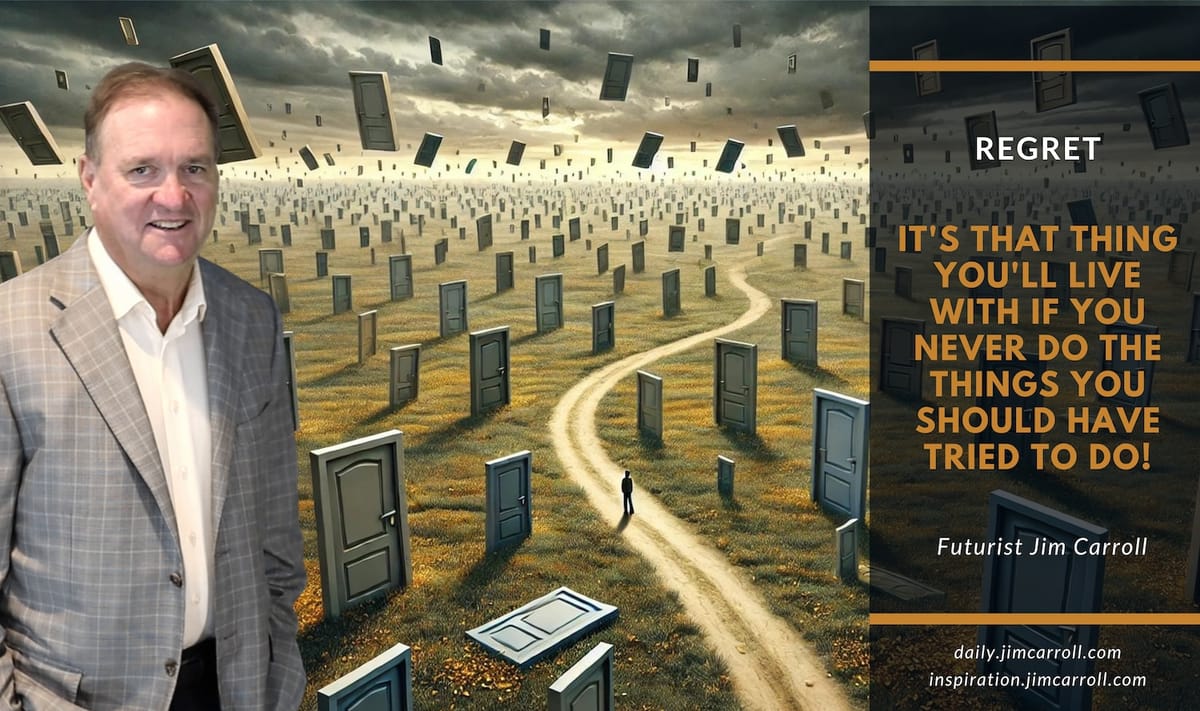"Regret: It's that thing you'll live with if you never do the things you should have tried to do!" - Futurist Jim Carroll
Life is a series of doors of opportunity all waiting to be opened!
Are you keeping them shut?
I was reminded of this fact yesterday when a writer for an industry publication called me; they're working on a profile piece. We had a great discussion about the long, strange trip I've had to become a global futurist., and the decisions that I took along the way to get me there. After the call, I dug out for him another profile piece (there have been many) that covered the voyage some twenty-one years ago - and reading it, I was reminded of my mindset for the opportunity that truly determined my fate.
Think about your reality - every single moment, there is a new opportunity around you. Every single instance, there are new futures that are presenting themselves. Every single second, you are faced with the decision, "Should I stay or should I go now?" (to borrow from The Clash!) What are you doing when you are confronted with these decisions? Do you go at that, or do you hold yourself in reserve, nervous about taking the big, bold steps that you should be taking?
Looking back at the article from 2003, I'm kind of fascinated by the mindset of opportunity that I was chasing even then. (If you are curious, the full article is here.)
Jim Carroll, 43, is a prime example of the professional pundit. Best known as the co-author
(with Rick Broadhead) of the Canadian Internet Handbook series of books, Carroll deliberately positions himself as an industry expert and has largely built his career since the early 1990s on his reputation as an Internet guru. (On his unapologetically promotional website, he bills himself as a motivational futurist.)
It's difficult to argue with his success. Carroll has to date published more than 30 books and writes columns for numerous national magazines, including Profit and CAmagazine. The majority of his income, however, comes from speaking engagements - his standard fee is a "high-end four-figure" —where he's booked largely on his renown as an e-commerce and technology/business strategy expert.
It hasn't come without risk. In 1990 Carroll was labouring in a secure, well-paying position at the national office of Thorne Riddell in Toronto. But the seeds of his current career were planted way back in 1982 when he first sat down in front of a computer in his Halifax home. He was immediately hooked. "I would stay up until 4 a.m. on bulletin boards," he says. His passion and knowledge about computers led him to a radio show in the early 1980s in Halifax called Micro Minute. They were one-minute spots on what he called the computer revolution, and they ran with the all-important promotional tagline: "Jim Carroll is a microcomputer expert for Thorne Riddell Halifax."
Thorne Riddell, however, didn't seem to be tuning in. In the mid-1980s, Carroll was trying to convince the firm of the business potential of e-mail and PCs in general. It fell largely on deaf ears. His colleagues weren't exactly encouraging either. "They said I was throwing away a good career in accounting," says Carroll. He was obstinate, however, so when the firm essentially told him in 1990 that he would never make partner, he left the company and launched his own consulting practice.
By then, he saw the beginnings of the Internet and recognized its sea-change potential for business.
"I knew it was going to be big."
Meet the Experts
CAMagazine, May 2003
The fact is, I knew 'it' was going to be big, and I wanted to be a part of 'it' - whatever 'it' was.
From those small beginnings was launched a global carer. At each moment, I was confronted with a door of opportunity - and rather than keeping it shut, I opened it wide. In 2000, as the dot.com hysteria of the Internet years imploded, I needed to pursue another big career change, deciding to establish myself on the global stage, so to speak, as a futurist. It was a natural transition since much of my work already involved covering the trends and opportunities of tomorrow.
Just a few years later, I found myself in a room of astronauts from NASA, describing to them the future disruption of the space industry, suggesting that rather than battle the reality of the tomorrow, they should open the doors of opportunity that it represents. I spent some time with the creative team at Disney, suggesting that the opportunities for the next generation of creativity were to be found in emerging new broadcast and distribution models. I spent some time with the PGA of America, suggesting that the doors of opportunity for the growth of the industry would come from aligning with the new forms of interaction that were emerging on social media.
I found myself talking with others about opening the doors of opportunity - and still do so today. I also realize that the foundation of many of the pathways to those doors comes from my own experience in always keeping those doors open, not shut.
With all this, ask yourself a few questions about your situation.
Are the doors in front of you staying closed?
Do you try to open them?
Do you live in fear of what tomorrow might bring, or do you shift your mind so that you banish the fear and replace it with nervous exhilaration?
Your answer to these questions matters!
By the way, a shoutout to ChatGPT - I asked it to generate an image involving the 'doors of opportunity,' and after a few iterations, it came up with something magical that I've used in today's quote!
Futurist Jim Carroll believes that doors are meant to be opened, not shut.

